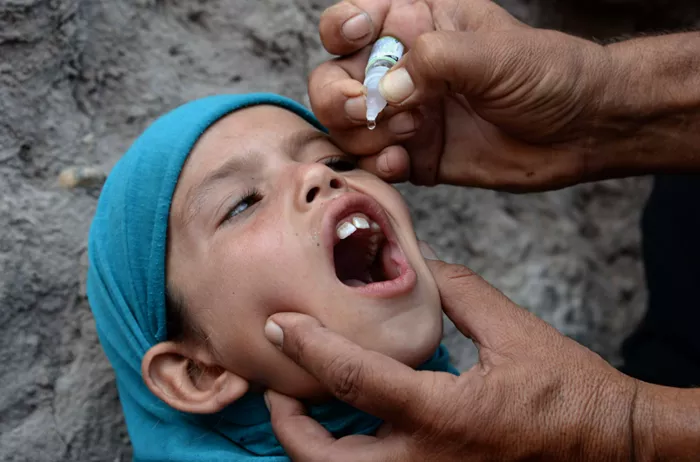The first recorded case of polio in Gaza in 25 years has put health workers and aid agencies under immense pressure to launch a mass vaccination campaign in the war-torn Palestinian territory.
As the conflict in Gaza extends beyond 10 months, the ongoing Israeli military operation, coupled with limited aid access and the intense summer heat, poses significant challenges to the success of this life-saving vaccination drive.
Despite these challenges, the equipment necessary for the campaign has already begun arriving in the region. According to the Palestinian Authority health ministry, tests in Jordan last week confirmed that a 10-month-old baby from central Gaza, who had not been vaccinated, has contracted polio.
The United Nations reports that this is the first polio case in Gaza in 25 years, although type 2 poliovirus was detected in wastewater samples from the territory in June. Poliovirus is highly contagious and spreads primarily through sewage and contaminated water, a growing problem in Gaza as the conflict drags on. The disease mainly affects children under five, leading to deformities, paralysis, and potentially death.
The World Health Organization (WHO) and UNICEF, both UN agencies, have outlined a plan to vaccinate 640,000 children across Gaza. However, the ongoing war, triggered by Hamas-led terrorist attacks on southern Israel on October 7, which resulted in nearly 1,200 deaths and 251 hostages, complicates these efforts.
“It’s extremely difficult to undertake a vaccination campaign of this scale and volume under a sky full of airstrikes,” said Juliette Touma, Director of Communications for UNRWA, the UN agency for Palestinian refugees.
Mass Vaccination Effort in the Works
The UN’s plan involves 2,700 health workers across 708 teams, with the WHO leading the effort, according to Richard Peeperkorn, the agency’s representative in the Palestinian territories. UNICEF is responsible for maintaining the cold chain necessary for the vaccines’ storage and distribution throughout Gaza, explained spokesperson Jonathan Crickx.
Cold chain equipment, including refrigerators, arrived on Wednesday at Ben Gurion Airport near Tel Aviv. Approximately 1.6 million doses of the oral polio vaccine are expected to arrive in Gaza on Sunday via the Kerem Shalom crossing from Israel, Crickx said.
The UN agencies aim to administer two doses to about 95% of children under 10 in Gaza. Extra doses will be available to compensate for losses due to heat or other factors. Although Israel has denied allegations of blocking aid into Gaza, relief workers face numerous obstacles in getting supplies into the territory, which is suffering from severe shortages of fuel, medical equipment, and food.
Once aid reaches Gaza, further complications arise due to ongoing fighting, widespread destruction, crumbling infrastructure, and looting by masked assailants.
Touma, who has worked on polio response efforts during wars in Iraq and Syria, emphasized that “the return of polio to a place where it’s been eradicated says quite a lot.”
Challenges and Cooperation Amid Crisis
The Hamas-run health ministry in Gaza claims that over 40,000 people have been killed or are presumed dead since the conflict began on October 7. However, these figures cannot be independently verified and do not distinguish between civilians and combatants. Israel states it has killed more than 17,000 combatants in the conflict and another 1,000 terrorists inside Israel on October 7.
Gaza’s health care system is in shambles, with “only 16 out of 36 hospitals… still functioning, and only partially,” according to Crickx. Of these, just 11 facilities can maintain the necessary cold chain for the vaccines.
The vaccines will first be stored at a UN facility in central Gaza before being distributed to public and private health facilities and UNRWA shelters. “Hopefully by refrigerated trucks if we can find some, otherwise by cold boxes filled with ice packs,” Crickx added. Many residents of Gaza now live in makeshift camps or UNRWA schools, making them difficult to reach, noted Moussa Abed, Director of Primary Health Care at Gaza’s health ministry.
The ongoing war has displaced much of Gaza’s 2.4 million residents, many of them multiple times. UN Secretary-General Antonio Guterres has called for two seven-day breaks in the conflict to administer vaccine doses.
Abed warned that “without a safe environment for the vaccination campaign, we will not be able to reach 95% of the children under the age of 10, which is the goal of this campaign.”
The Israeli Defense Ministry agency COGAT, which oversees civilian affairs in the Palestinian territories, did not specifically mention the planned UN campaign but stated that “on the issue of polio, a joint effort will be made together with the international community.” A COGAT spokesperson promised “full cooperation.”


